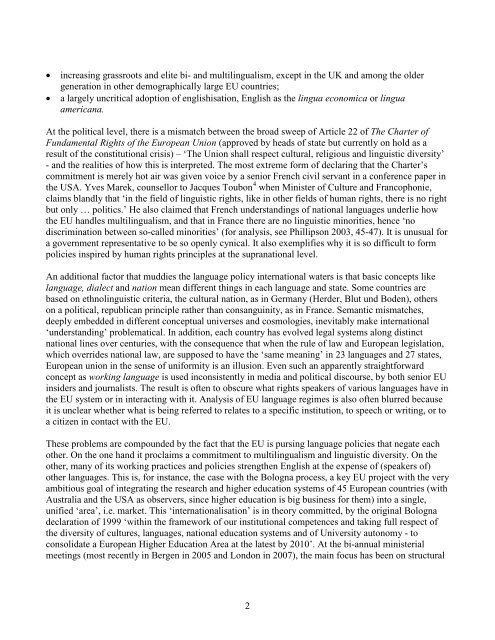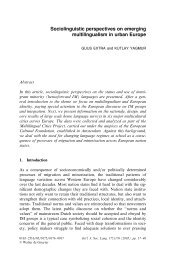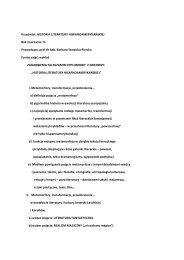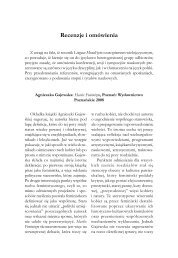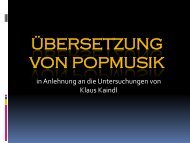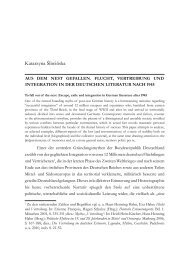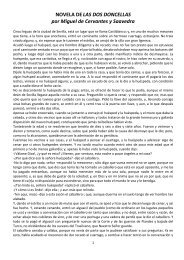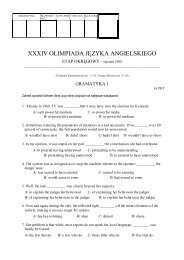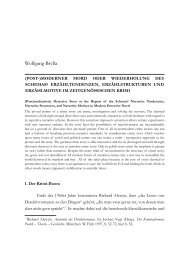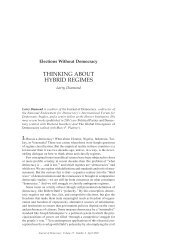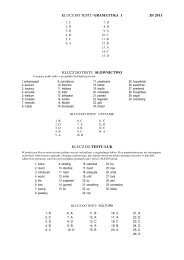R20 Phillipson 2008 English in EU lingua frankensteinia.pdf
R20 Phillipson 2008 English in EU lingua frankensteinia.pdf
R20 Phillipson 2008 English in EU lingua frankensteinia.pdf
- No tags were found...
Create successful ePaper yourself
Turn your PDF publications into a flip-book with our unique Google optimized e-Paper software.
• <strong>in</strong>creas<strong>in</strong>g grassroots and elite bi- and multil<strong>in</strong>gualism, except <strong>in</strong> the UK and among the oldergeneration <strong>in</strong> other demographically large <strong>EU</strong> countries;• a largely uncritical adoption of englishisation, <strong>English</strong> as the l<strong>in</strong>gua economica or l<strong>in</strong>guaamericana.At the political level, there is a mismatch between the broad sweep of Article 22 of The Charter ofFundamental Rights of the European Union (approved by heads of state but currently on hold as aresult of the constitutional crisis) – ‘The Union shall respect cultural, religious and l<strong>in</strong>guistic diversity’- and the realities of how this is <strong>in</strong>terpreted. The most extreme form of declar<strong>in</strong>g that the Charter’scommitment is merely hot air was given voice by a senior French civil servant <strong>in</strong> a conference paper <strong>in</strong>the USA. Yves Marek, counsellor to Jacques Toubon 4 when M<strong>in</strong>ister of Culture and Francophonie,claims blandly that ‘<strong>in</strong> the field of l<strong>in</strong>guistic rights, like <strong>in</strong> other fields of human rights, there is no rightbut only … politics.’ He also claimed that French understand<strong>in</strong>gs of national languages underlie howthe <strong>EU</strong> handles multil<strong>in</strong>gualism, and that <strong>in</strong> France there are no l<strong>in</strong>guistic m<strong>in</strong>orities, hence ‘nodiscrim<strong>in</strong>ation between so-called m<strong>in</strong>orities’ (for analysis, see <strong>Phillipson</strong> 2003, 45-47). It is unusual fora government representative to be so openly cynical. It also exemplifies why it is so difficult to formpolicies <strong>in</strong>spired by human rights pr<strong>in</strong>ciples at the supranational level.An additional factor that muddies the language policy <strong>in</strong>ternational waters is that basic concepts likelanguage, dialect and nation mean different th<strong>in</strong>gs <strong>in</strong> each language and state. Some countries arebased on ethnol<strong>in</strong>guistic criteria, the cultural nation, as <strong>in</strong> Germany (Herder, Blut und Boden), otherson a political, republican pr<strong>in</strong>ciple rather than consangu<strong>in</strong>ity, as <strong>in</strong> France. Semantic mismatches,deeply embedded <strong>in</strong> different conceptual universes and cosmologies, <strong>in</strong>evitably make <strong>in</strong>ternational‘understand<strong>in</strong>g’ problematical. In addition, each country has evolved legal systems along dist<strong>in</strong>ctnational l<strong>in</strong>es over centuries, with the consequence that when the rule of law and European legislation,which overrides national law, are supposed to have the ‘same mean<strong>in</strong>g’ <strong>in</strong> 23 languages and 27 states,European union <strong>in</strong> the sense of uniformity is an illusion. Even such an apparently straightforwardconcept as work<strong>in</strong>g language is used <strong>in</strong>consistently <strong>in</strong> media and political discourse, by both senior <strong>EU</strong><strong>in</strong>siders and journalists. The result is often to obscure what rights speakers of various languages have <strong>in</strong>the <strong>EU</strong> system or <strong>in</strong> <strong>in</strong>teract<strong>in</strong>g with it. Analysis of <strong>EU</strong> language regimes is also often blurred becauseit is unclear whether what is be<strong>in</strong>g referred to relates to a specific <strong>in</strong>stitution, to speech or writ<strong>in</strong>g, or toa citizen <strong>in</strong> contact with the <strong>EU</strong>.These problems are compounded by the fact that the <strong>EU</strong> is purs<strong>in</strong>g language policies that negate eachother. On the one hand it proclaims a commitment to multil<strong>in</strong>gualism and l<strong>in</strong>guistic diversity. On theother, many of its work<strong>in</strong>g practices and policies strengthen <strong>English</strong> at the expense of (speakers of)other languages. This is, for <strong>in</strong>stance, the case with the Bologna process, a key <strong>EU</strong> project with the veryambitious goal of <strong>in</strong>tegrat<strong>in</strong>g the research and higher education systems of 45 European countries (withAustralia and the USA as observers, s<strong>in</strong>ce higher education is big bus<strong>in</strong>ess for them) <strong>in</strong>to a s<strong>in</strong>gle,unified ‘area’, i.e. market. This ‘<strong>in</strong>ternationalisation’ is <strong>in</strong> theory committed, by the orig<strong>in</strong>al Bolognadeclaration of 1999 ‘with<strong>in</strong> the framework of our <strong>in</strong>stitutional competences and tak<strong>in</strong>g full respect ofthe diversity of cultures, languages, national education systems and of University autonomy - toconsolidate a European Higher Education Area at the latest by 2010’. At the bi-annual m<strong>in</strong>isterialmeet<strong>in</strong>gs (most recently <strong>in</strong> Bergen <strong>in</strong> 2005 and London <strong>in</strong> 2007), the ma<strong>in</strong> focus has been on structural2


